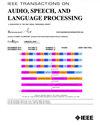用于立体系统降噪的时域宽线性LCMV滤波器
IEEE Transactions on Audio Speech and Language Processing
Pub Date : 2013-07-01
DOI:10.1109/TASL.2013.2248719
引用次数: 17
摘要
本文讨论了立体声系统中的降噪问题,其目标不仅是降低噪声,而且要保留所需语音和噪声源的空间信息,以便听者仍然可以通过收听增强的双耳输出来定位语音和噪声源。为了实现这一目标,我们使用了先前开发的广泛线性(WL)框架,并将双耳降噪问题转化为复杂信号的单耳滤波问题。然后,我们提出了一种将复杂语音和噪声信号向量分解为两个正交分量的方法:一个与相应的当前信号样本相关,另一个不相关。通过这种分解,将保留语音和噪声源空间信息的降噪问题表述为具有两个约束条件的优化问题:一个约束条件是期望语音,另一个约束条件是保留噪声信号。然后,我们推导了一个WL线性约束最小方差(LCMV)滤波器,它可以利用复杂语音信号的统计性和非圆性来实现降噪。与之前开发的WL Wiener和最小方差无失真响应(MVDR)滤波器只能保留期望声源的特征和空间信息相比,这种新的WL LCMV滤波器具有降低噪声的潜力,同时保留期望声源和噪声源的特征和空间信息。实验结果证明了所提出的WL LCMV滤波器的优点。本文章由计算机程序翻译,如有差异,请以英文原文为准。
On the Time-Domain Widely Linear LCMV Filter for Noise Reduction With a Stereo System
This paper deals with the problem of noise reduction in stereo sound systems where the objective is not only to reduce noise, but also to preserve the spatial information of both the desired speech and noise sources so that the listener can still localize the speech and noise sources by listening to the enhanced binaural outputs. To achieve this objective, we use the widely linear (WL) framework developed previously and convert the problem of binaural noise reduction into one of monaural filtering with complex signals. We then present a way to decompose both the complex speech and noise signal vectors into two orthogonal components: one correlated and the other uncorrelated with the corresponding current signal sample. With this decomposition, the problem of noise reduction with preservation of the spatial information of speech and noise sources is formulated as an optimization problem with two constraints: one on the desired speech and the other on the preservation of the noise signal. We then derive a WL linearly constrained minimum variance (LCMV) filter, which can take advantage of the statistics and noncircularity of the complex speech signal to achieve noise reduction. In contrast to the WL Wiener and minimum variance distortionless response (MVDR) filters developed previously that can only preserve the characteristics and spatial information of the desired sound source, this new WL LCMV filter has the potential to reduce noise while preserving the characteristics and spatial information of both the desired and noise sources at the same time. Experimental results are provided to justify the claimed merits of the proposed WL LCMV filter.
求助全文
通过发布文献求助,成功后即可免费获取论文全文。
去求助
来源期刊
自引率
0.00%
发文量
0
审稿时长
24.0 months
期刊介绍:
The IEEE Transactions on Audio, Speech and Language Processing covers the sciences, technologies and applications relating to the analysis, coding, enhancement, recognition and synthesis of audio, music, speech and language. In particular, audio processing also covers auditory modeling, acoustic modeling and source separation. Speech processing also covers speech production and perception, adaptation, lexical modeling and speaker recognition. Language processing also covers spoken language understanding, translation, summarization, mining, general language modeling, as well as spoken dialog systems.

 求助内容:
求助内容: 应助结果提醒方式:
应助结果提醒方式:


